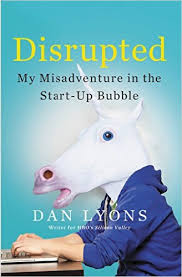One of the things I like about reading is discovering words and ideas that are new to me.
Today, while reading the laugh-out loud book, “Disrupted: My Misadventure in the Start-Up Bubble“, by Dan Lyons (which I highly recommend), he mentioned the Dunning-Kruger effect.
I had never heard of this, and while Dan offered a description of it, I wanted to find out more. So when I got home I immediately logged onto old faithful, Wikipedia, and found the following.
The Dunning–Kruger effect is a cognitive bias in which relatively unskilled persons suffer illusory superiority, mistakenly assessing their ability to be much higher than it really is. Dunning and Kruger were at Cornell University when they discovered this back in 1999, and attributed this bias to a metacognitive inability of the unskilled to recognize their own ineptitude and evaluate their own ability accurately. Their research also suggests corollaries: highly skilled individuals may underestimate their relative competence and may erroneously assume that tasks which are easy for them are also easy for others.
Dunning and Kruger proposed that, for a given skill, incompetent people will:
- fail to recognize their own lack of skill
- fail to recognize the extent of their inadequacy
- fail to accurately gauge skill in others
- recognize and acknowledge their own lack of skill only after they are exposed to training for that skill
Meanwhile, students of high ability tended to underestimate their relative competence. Roughly, participants who found tasks to be easy erroneously presumed that the tasks also must be easy for others; in other words, they assumed others were as competent, if not more competent, than themselves.
I like to think I’m fairly self-aware, and have a good sense of which things I’m competent at (a relatively short list) and which things I am incompetent at (which goes on for pages).
But after learning about the Dunning Kruger effect, I’m concerned.
I readily admit my incompetence/lack of knowledge of such things as how cars work, how to fix things, how to cook, the names of virtually any tree or flower, how to get more subscribers to my blog (hint, hint – just enter your email address in the box on the left), how to socialize at a party, and on and on.
But what about the things I think I’m good at, or at least competent? Could it be that the things I think I am competent at I’m really not, that I’m overestimating my skills?
For example, it may have taken me 30 years, but I think I’ve gotten OK at explaining certain concepts in accounting, such as revenue recognition or process costing. But am I fooling myself, is my belief just an illusion?
As noted above, incompetent people don’t really know that they are incompetent. Sure, I could point to student tests and say that when students do well, it must be because I taught them so well. But I’m self-aware enough to know that students could certainly learn on their own, and in spite of how bad a teacher I may be.
I also take pride in my driving ability, and think I am in the top 1% of drivers on the road. I’ve written a blog about my driving philosophy known as “X Plus 7“, and I think such a philosophy makes me a great driver. But when I sit back and realize that virtually every car on the highway is passing me, I start to wonder, am I the bad driver, and I don’t know it?
It seems like a catch-22.
How do you find out if you’re not good at something, if you’re not aware that you’re not good at something; the phrase “ignorance is bliss” comes to mind.
But maybe I shouldn’t worry so much. Dunning and Kruger were awarded the 2000 Ig Nobel prize in psychology for their research. I’ve always thought of these awards as poking fun at silly academic research, and so I figured this award meant that their findings weren’t really true. My fears about my teaching or driving ability (or really, the lack thereof) were somewhat allayed.
But then I decided to click on the link to the Ig Nobel web site. I read that the awards are given “For achievements that first make people LAUGH
then make them THINK”. The prizes are intended to celebrate the unusual, honor the imaginative — and spur people’s interest in science, medicine, and technology.
In the site’s FAQ section they have the following Q&A:
Are you ridiculing science?
No. We are honoring achievements that make people laugh, then think. Good achievements can also be odd, funny, and even absurd; So can bad achievements. A lot of good science gets attacked because of its absurdity. A lot of bad science gets revered despite its absurdity.
So after reading that, I’m not really sure what to think; did Dunning and Kruger get the award because it was good science that was odd, funny, or absurd OR did they get the award because it was bad science that was revered despite its absurdity?
And it’s not like I can ask my students if I am a competent teacher; what student would give an honest answer to your face to that question, and besides, who’s to say they are competent enough to answer such a question?
It seems like thinking about the Dunning-Kruger is like getting stuck in an infinite programming loop. If you’re incompetent, you don’t know. And if you think you are competent, isn’t it possible that you really are incompetent?
I guess I’ll just keep living in my fantasy world, believing that there are some things I’m at least OK at doing. But if I’m not, will someone please come along and show me why I’m actually incompetent; I’d really like to know…

